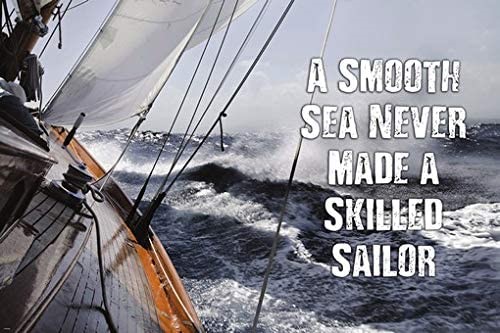What sort of investor are you?
If you examine your goals and desires, where do they really sit?
In the course of my investing career, I’ve noticed two main camps.

Source: Amazon
Sailors and submarines
There are the sailors. They invest long in the market and navigate the ups and downs. Some get seasick and panic at the volatility and drawdowns. More grizzled hacks ride the storms and wait for sunnier days.
I am a sailor. My style of value investing is focused on companies I understand, supported by good assets and large customer bases.
- The global markets present more than enough opportunity for me to capture upside.
- I buy the dips. Especially large panicked ones like Covid-19 in 2020 — or the Russia-Ukraine crisis in 2022.
- Then I buy dividends to secure ongoing income streams. The ever-changing waters of the financial markets give me opportunity to buy dips and dividends.
Of course, when you buy into any business, you’re taking risks. And businesses sitting at value can take a while to realise their potential. This is no silver bullet to wealth. But it can build it over time.
Then there are the submarines. These individuals believe they can develop a strategy that can beat the market.
- They might invest in assets outside regular public markets, such as cryptocurrency.
- They might trade in and then out in a short space of time.
- They talk about generating ‘alpha’. Being ‘uncorrelated’. Flipping forex, stocks or even property.
Which works better?
My general sense is that sailors last the long haul.
Warren Buffett and Charlie Munger are sailors. They find value and ride it out. As Buffett says, the market could close for a year, then wake up. And he wouldn’t mind since his value has likely grown.
Submarines can run out of fuel. At best, they make some money for a period. Then the rest of the market cottons on. Less skilled navigators simply lose money.
When I worked in offshore finance, I saw a hedge fund that had a remarkable black-box trading system for commodities. This worked for several years. They raised a lot of money. Then it turned negative, and new money dried up.
Then there are the many stories of those who made quick money with Bitcoin. Or high momentum stocks like Workhorse Group [NASDAQ:WKHS].
That’s great. Well-deserved. These investors took very considerable risk, and that has paid off.
But you don’t hear the stories of those who bought Workhorse at $40. (Today it’s around $3). Or those who got scared when Bitcoin started tumbling precipitously and sold out at large losses.
The point with submarine strategies is that they’re hard to develop. And very hard to make successful over the longer run.
Studies tend to show that most investors cannot time the market. But those who invest wisely over time tend to do the best overall.
Resilience and adaptability
These are the best qualities an investor can develop. Being able to accept losses when the market panics. Then knowing which companies sit at value and are worth going into.
Case in point: we made a bet that certain property companies smashed by the pandemic would bounce back. This was a simple equation. The price-to-book ratio in their share price showed a 40% discount on prime Australasian property. One company is now up over 100% with dividends resuming.
To provide another analogy: the domestic cat is an adaptable creature. Descending from wild felines, it has learnt to live with humans such that it receives all the upside. Live in a warm home. Get fed. Be loved. Well, for the most part.
Compare that with the panda bear. It relies on bamboo for food, which it needs a lot of to get the protein required. That habitat is disappearing, but it can’t survive on anything else. It struggles to mate. In captivity, it has even been provided ‘panda porn’ in an attempt to motivate procreation.
As a sailor, you’re not trying to go against the market. You’re navigating what it offers in the best possible way. You’re adaptable.
Investing in this market
Since the pandemic and money printing, asset prices are very high.
But there are still pockets of value, particularly in ‘reopening’ areas such as retail and energy.
Inflation looks to be a threat for the next while. So you’re going to need businesses that can increase their prices.
In our strategy for our Wholesale Managed Accounts, we’re looking for dips and dividends.
And for our Premium Readers, we’re profiling specific global opportunities beyond the radar.
It’s an exciting time to be at sea.
Regards,
Simon Angelo
Editor, Wealth Morning
(This article is commentary and the author’s personal opinion only. It is general in nature and should not be construed as any financial or investment advice. To obtain guidance for your specific situation, please consult a licensed Financial Advice Provider.)





Simon is the Chief Executive Officer and Publisher at Wealth Morning. He has been investing in the markets since he was 17. He recently spent a couple of years working in the hedge-fund industry in Europe. Before this, he owned an award-winning professional-services business and online-learning company in Auckland for 20 years. He has completed the Certificate in Discretionary Investment Management from the Personal Finance Society (UK), has written a bestselling book, and manages global share portfolios.